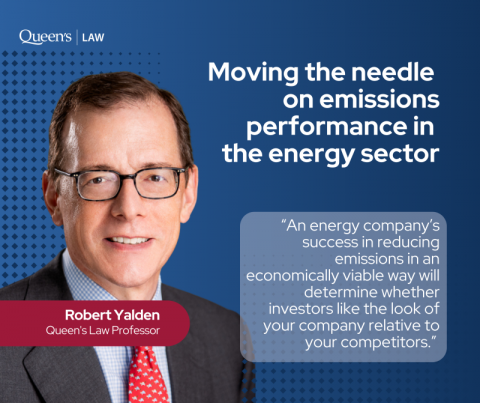
Part five of an eight-part series featuring legal insights from Queen’s Law scholars and practitioners
Energy sector must move the needle on emissions performance
The $5 billion allocated in the Liberal government’s April 19 budget to the Net Zero Accelerator – a fund that helps large-emitting companies reduce their GHG emissions – on top of the $3 billion committed in December 2020, highlights the expectations and challenges that the Canadian oil and gas industry faces in aggressively transitioning to a low-carbon economy.
Professor Robert Yalden, the Stephen Sigurdson Professor in Corporate Law and Finance, emphasizes that governments, customers, and investors are scrutinizing each company’s emissions-reduction performance against its competitors. “Most oil and gas industry players now understand they have to move the needle on emissions performance,” he observes. “Like it or not, the pressure is coming from investors, markets, and customers, not just governments. An energy company’s success in reducing emissions in an economically viable way will determine whether investors like the look of your company relative to your competitors.”
Since the Supreme Court’s March 25 decision, provincial governments and the federal Conservative party have all agreed to support some form of carbon pricing. “Every party now has a stance on what needs to be done,” he says. “It’s no longer a question of do we need to do something, but how do we do it? The pressure is on to act now.”
Yalden sees challenges and opportunities for companies to reduce GHG emissions by shifting power sources; reducing or eliminating gas flaring and methane leaks; carbon capture and storage; and disposing of assets that create problems in meeting emissions targets. “There are no one-size-fits-all solutions,” he says. “Each company has to sort out its carbon strategy in light of variables that differ from one company to the next.”
Decarbonization through electrification is one important strategy. “Companies in upstream extraction and drilling are huge power users. Can they develop and move economically to lower-emission sources? It depends on a company’s location,” Yalden says. “Can they develop electricity-based technologies that will replace diesel fuel? Some oil and gas companies are already using on-site solar power where they can.”
The industry has technology and engineering strengths; harnessing them could be a viable path to net-zero. “Any energy company must consider technology options and strategies to reduce emissions,” says Yalden. “Some crude oil companies, for example, are looking at solvents to extract oil, reducing or eliminating natural gas’s role.
“The challenge for governments is to provide the right kinds of incentives and supports, well aligned with the reality of what these companies need to accomplish,” he says. “How do policy-makers find a way for the energy industry to do everything it can to reduce emissions and integrate new technology without crushing the industry? These are big, asset-intensive companies; revamping them from top to bottom can’t be done overnight. The energy industry has long been a pillar of the Canadian economy, so we have to get it right.”
Professor Robert Yalden, the Stephen Sigurdson Professor in Corporate Law and Finance, is a former senior partner with Osler, Hoskin and Harcourt LLP.
Watch for the next stories in this series featuring our experts’ opinions on three other areas – insurance, environment, and Indigenous rights, and the energy sector – and their concluding remarks.
Read earlier parts of this series:
“Constitutional authority to address humanity’s existential threat,” featuring Professors Cherie Metcalf and Nicolas Lamp.
"Trade measures can help countries strategize about emission reduction," featuring Professor Nicolas Lamp.
“Insurance industry pivots to address large-scale climate risks,” featuring Professor Erik Knutsen.
“Global shift to climate-related financial disclosure and sustainable accounting,” featuring Professor Robert Yalden.
By Mark Witten